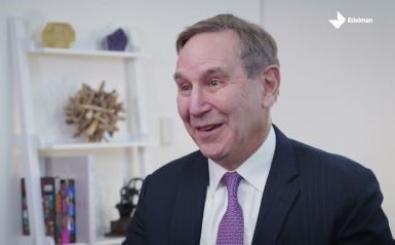Margrethe Vestager, Executive Vice President and Commissioner-Designate for Competition and Digital Policy says:
“Some say China has all the data, and the U.S. has all the money. But in Europe, we have purpose.”
On Tuesday 8th October, Margrethe Vestager faced her three-hour public hearing in front of the European Parliament. A much-awaited last day of parliamentary hearings that saw the three nominated Executive Vice Presidents -Margrethe Vestager, Frans Timmermans and Valdis Dombrovskis- answer questions from the European Parliament. These hearings are designed to allow members of the European Parliament to assess the suitability of Commissioner-Designates for the job, after which they will vote to reject or confirm the entire College of Commissioners.
Known as the EU’s competition chief and hardliner against the tech giants, Margrethe Vestager is no beginner to these parliamentary hearings. To nobody’s surprise, she navigated smoothly through the hearing and received the backing of all political groups but the Eurosceptic far right. MEPs from the Industry, Research and Energy (ITRE); Internal Market and Consumer Protection (IMCO); and Economic and Monetary Affairs (ECON) committees led her questioning on Tuesday.
In the new European Commission, the Danish nominee is set to be confirmed as Executive Vice President for a Europe fit for the Digital Age. As such, she will steer and coordinate the EU’s digital policy while also being handed in a second term to head the EU’s competition portfolio and make it fit for the digital economy. Her responsibilities are therefore enhanced as she takes both a function of policy coordination and enforcement. A dual role that is considered controversial.
At Edelman, we carried out a short analysis showing you which topics dominated the hearings and which ones ended up trending on Twitter. Here are our key takeaways!
WHAT MEPs FOCUSED ON: DIGITAL & COMPETITION EQUALLY REPRESENTED
- Margrethe Vestager faced what can well be described a balanced hearing, with 13 questions on her digital portfolio and 10 questions on her competition portfolio.
- However, we could have expected more questions on her dual role and how this represents a conflict of interest. Featuring prominently in Parliament’s written questions prior to her hearing, only two MEPs asked a question in relation to this.
- On digital policy, MEPs were interested in gaining clarity on the new Digital Services Act, digital taxation and a future AI legislation. Other topics also included Vestager’s SMEs strategy and how she will ensure these small businesses and entrepreneurs can make the most of digitization.
- On competition policy, MEPs were interested in finding out how she will ensure the enforcement of fair competition rules and adapt the concept of market power to the digital age, strengthen enforcement remedies beyond the application of fines and implement fair corporate taxes. MEPs were also keen to hear how she intends to keep the climate goals in mind and follow a green competition agenda.
What has been left out? Although, MEPs did not leave much out, we could have expected more questions on how she aims to lead Europe’s digital agenda in collaboration with Commissioner-Designates Didier Reynders (Justice) and Sylvie Goulard (Internal Market).
TRUST, FAIRNESS AND HUMANITY AT THE CENTRE OF VESTAGER’S ANSWERS
In her opening statement, Vestager pointed to the need to engage with people’s concerns regarding new technologies and create Trust. European tech policy would be centered around ethics and a human-centric approach supporting human decision-making and not replacing it. Trust also related to fairness in the digital economy where she highlighted platform workers’ rights to fair working conditions and digital taxation rules.
Artificial Intelligence was, as expected, a popular topic during Vestager’s hearing. MEPs were keen to find out whether the aim to deliver legislation on AI within the first 100 days of her mandate was over-ambitious and could hamper innovation by overregulation. Vestager replied by saying “we are in a hurry” which points to the global arms race on AI leadership. She assured that due care would be taken to avoid overregulation by closely listening to stakeholders in order to build trust in the European approach to AI.
Geopolitical implications further stood out, with Vestager clearly defining her European vision of artificial intelligence: one that has “purpose”. In this regard, she highlighted the use of AI, particularly in the fields of healthcare, environment and mobility. In response to how she aims to address the risks of using AI and biased data sets, she agreed that discrimination resulting from biased training data was one of the most important issues impacting Trust in AI. She pointed out the need to address the biases in our societies, one of the key reasons why these are replicated within AI systems in the first place.
“You can have your AI as soon as I have my gender balanced society!
To be world leaders, we need ethical guidelines”
On the tax of digital services, Vestager reassured the MEPs on her commitment to find an international agreement by end of 2020 and if not, to go ahead in proposing one for the EU only.
“I hope we will find a global agreement (…) But if we can't find a global agreement, yes we indeed will act ourselves”
In response to how she aims to strengthen competition rules, Vestager signaled some possible changes for her second term. Regarding the Commission’s assessment of market power in digital markets going forward, Vestager said that this would also reflect “the ability to capture a lot of data” in addition to existing indicators such as market share. In addition to competition in a digital market, competition for the market will be assessed, which can be taken to mean that Vestager will focus on avoiding any winner takes all scenarios in a data economy. Dominance in access to data could work as barrier to market entry for smaller players. MEPs were further keen to find out whether she would, to effectively dissuade abuse of market power, consider imposing stronger remedies than fines. MEPs classified fines as “operational expenses charged back to the consumer”. Vestager did acknowledge that stronger remedies may be needed. She said that imposing business divestitures (commonly referred to as “breaking up” tech companies) was already a remedy in the Commission’s toolbox but hastened to add that such remedies would be “very intrusive”.
“We have to consider remedies that are much more far-reaching”
COMPATIBILITY OF VESTAGER’S PORTFOLIO
On the few questions regarding her dual role as enforcer and coordinator of digital policy, Vestager pointed to the checks & balances already inherent in Commission decision-making in competition and mergers. She stressed that these decisions must be adopted and supported by the whole College and not by her alone. In addition, Vestager said that proposing legislation remains the domain of the Directorate Generals. At DG level, the Legal Service and the Chief Economist are entrusted with ensuring that proposals are robust and objective enough to withstand any legal challenges down the line.
WHAT WAS TRENDING ON TWITTER

- We looked at the conversation during (see wordcloud on the left) and after (see wordcloud on the right) the hearing and analysed the tweets containing the hashtag “vestager”.
- As expected, the number of tweets after the hearing dropped down to 70%. Interestingly, the focus of the conversation also changed. During the hearing, “digital” was the most frequent word used in tweets. After the hearing, “digital” was replaced by the word “competition” to appear most frequently.
- In addition, some topics continued trending on Twitter both during and after the hearing, which points to their importance in future debates. The words “companies” “google” “tech” “data” “fines” and “antitrust” appeared in relatively high frequency in both wordclouds. In contrast, it is surprising not to see the word “AI” appearing in the discussion after the hearing anymore.
How can Edelman help?
Edelman is a global communications firm that partners with businesses and organisations to evolve, promote and protect their brands and reputations. In order to ensure that the new 2019-2024 institutional cycle creates a favourable policy, regulatory and business environment for you, it will be necessary to think about embedding new ways of working into your day-to-day role.
We would be delighted to continue this conversation at your convenience.




